At a recent playback for his second solo album, G I R L, Pharrell Williams seemed to catch his audience by surprise. There they all were, gathered to hear a record they no doubt imagined might contain more of the carefree Motown melodies of his current hit, Happy. Instead, they were first treated to the singer's take on 21st-century feminism.
"Women," Williams told the room of expectant journalists, "are a phenomenal force in my life and in my career" and "the cornerstone of existence". He went on to envisage a future world in which "75% of it is run by women … and I want to be on the right side of it."
Those present would be forgiven for feeling confused, given the way that Williams had spent his 2013. On the surface, it was an astonishing few months for the Neptunes and N*E*R*D man: he sang on the year's two biggest records – Daft Punk's Get Lucky and Robin Thicke's Blurred Lines – impressively rejuvenating a career that had stuttered to the extent that he had, only a year earlier, found himself guesting on Mika tracks. On the other hand, this rejuvenation clashed with a burgeoning fourth wave of feminism that refused to accept lyrics such as Blurred Lines's "I'll give you something big enough to tear your ass in two" without a fight. By the time 2013 was out, Williams found himself having to defend a track that had been banned by several university student unions and declared, somewhat improbably, to be "the most controversial song of the decade".
G I R L, then – Williams's first solo record since 2006's In My Mind – is no doubt his attempt to reposition himself. It comes billed as a "celebration" of womankind, even if said celebration has slightly less to do with achieving equal pay and flexible working hours than it does recounting how nice it is to have sex with pretty ladies. Indeed, you wonder quite when Pharrell decided on the record's loose concept. First, there's the album sleeve in which he appears with three other women, looking for all the world like they've just stepped out of a hot tub together (no doubt after a furious session debating intersectionality). Then there's Come Get It Bae, in which Pharrell, over throbbing bass and handclaps, enlists Miley Cyrus to add backing vocals to his pleas of "Wanna pop a wheelie?" and "Take it easy on the clutch" – the kind of ungainly sexual metaphor that puts him up there with such renowned musical feminists as Mick Jagger and R Kelly. When Gush – the subject of which you can probably gather from the title – threatens to "leave those panties in flames", you start to wonder if Pharrell's feminism is not a million miles from the Uni Lad whose love of women centres around being really into lesbian scenes.
But that would be unfair. There's plenty here to at least suggest a realisation of where Blurred Lines got it wrong: it wasn't the lustful intent that made it repugnant – believe it or not, pop music has previously ventured into the territory of men being quite keen on having sex with women – more the charmless, threatening manner it went about it.
This article includes content provided by Spotify. We ask for your permission before anything is loaded, as they may be using cookies and other technologies. To view this content, click 'Allow and continue'.
Reading this on mobile? Click here to view video
Conversely, the mood on G I R L is celebratory rather than predatory, concerned with conveying a sense of musical joy that's remarkably hard to pull off when your music is this precision-tooled. Marilyn Monroe is a deliriously immediate opener built from pizzicato strings and high-fretted funk riffs, as Williams dismisses the likes of Cleopatra and Joan of Arc in favour of a "different girl". Brand New features Justin Timberlake and overloads on carnival atmosphere, with its relentlessly cheery horns and irrepressible desire to out-Jacko Michael Jackson.
When the sex jams come, as on the computerised Southern twang of Hunter, Williams at least tries to pre-empt any backlash by claiming the notch-on-bedpost lyrics – "Taxidermy is on my walls, with the full description of the kill and cause" – are sung from the perspective of a female hunting him, which does have a slight air of "Christ, how am I going to explain this one?"
It's not all one-track minded. Gust of Wind – a sophisticated 70s funk number that features Daft Punk's robot voices on the chorus and feels expensive enough to have appeared on Random Access Memories – is more concerned with examining the awe-inspiring effects of love. The astonishing Lost Queen is a message of utter devotion constructed from African rhythms and a male choir that is reminiscent not only of Graceland, but also pretenders to Williams's throne such as Frank Ocean (Lost Queen's experimental leanings, which counterbalance the rush of pop hits here, include a 70-second segue of crashing waves before embarking on a cosmic "hidden" track Freq). I Know Who You Are, a sweet duet about togetherness with a gentle reggae lilt, even sees Alicia Keys offer up a pledge: "I want every woman to make a pledge with me/ I will do what I need until every woman on the Earth is free."
As present-day identity politics goes, it's not exactly Planningtorock's Let's Talk About Gender Baby, but that doesn't matter. An album in which Williams dims the lights, winks seductively and then sits down to discuss how we go about dismantling a patriarchal society that keeps us all enslaved is an album that precisely nobody wants to hear. Williams is wise enough to know what he does best, and as the Prince-like finale, It Girl, embarks on its long instrumental fade – guitar riffs streaking out like fireworks while cowbells clang – you can't deny that this is the sound of an artist thoroughly enjoying himself. Sometimes that's the most important message of all.
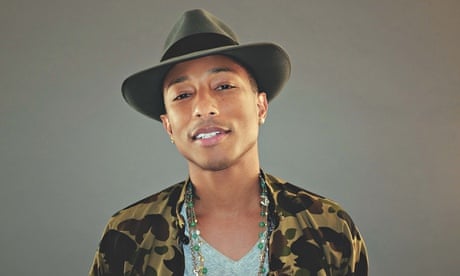
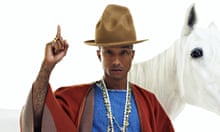

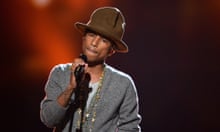
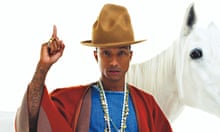
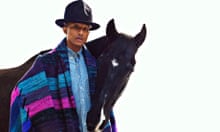

Comments (…)
Sign in or create your Guardian account to join the discussion